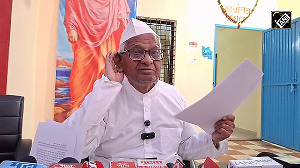The Indian Naval hospital Asvini is planning to set up a state of the art stem cell centre in collaboration with various civil institutes.
The centre will develop the technology to collect and manipulate stem cells of both adult and embryonic origin, for regeneration of various tissues damaged by disease or trauma (regenerative medicine), as well as possible nuclear radiation fall-out and war injuries.
The director general, Armed Forces Medical Services, Surgeon Vice Admiral VK Singh had recently expressed his willingness to fund such a centre at a recently concluded continued medical education programme on 'stem cells in war and peace'.
"Research into stem cells in INHS Asvini is in its infancy. The first priority is to use stem cells in its well-established role of bone marrow transplant and a patient of multiple myeloma, a blood disorder, has been started on this procedure. His stem cells have been collected using a cell separator and stored. This will be reinfused after administering high dose of chemotherapy," defence ministry sources told PTI on Friday.
"Umbilical cord blood collection and storage is being actively carried out and has been done in few cases. At present this is recommended only for those whose sibling is already suffering from a blood disorder and may need a transplant in future," the sources said.
During the CME, Dr Purvish Parikh, head of medical oncology at Tata Memorial Hospital and honorary consultant to the Armed Forces, highlighted the potential of utilising stem cells in the event of nuclear fallout - a problem not only faced by the Armed Forces, but also likely to involve large sections of civilian population, the sources said.
He highlighted the potential use of stem cells in the treatment of severe bone marrow failure due to radiation exposure in the event of nuclear catastrophe, and the system is in place in Europe for such eventuality.
The problems and potential of umbilical cord blood as a source of stem cells were eloquently brought out by Dr Rajat Kumar, professor of hematology at All India Institute of Medical Sciences, and a pioneer in this field in India.
He also highlighted the potential and limitations of cord blood storage to meet a disaster situation and suggested storage of stem cells of key/vulnerable soldiers/civilians as a possible safeguard for treatment after a nuclear accident.
Col Velu Nair from the prestigious Army Hospital (Research & Referral), New Delhi described the well established rule of stem cell transplantation in diseases of blood and highlighted the work done in this field in the two bone marrow transplant centres of the Armed Forces in Delhi and Pune. Ninety-six transplants have been done in his centre in Delhi so far.
Addressing the CME, Vice Admiral SS Byce, flag officer, commanding-in-chief, Western Naval Command emphasised the need for the best expertise from the civil and armed forces to come together to utilise stem cell technology.
He emphasised that this has immense potential in treating problems of specific interest to the military such as nuclear fallout and war injuries, and hitherto untreatable disorders of mankind at large.





